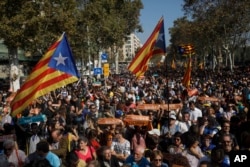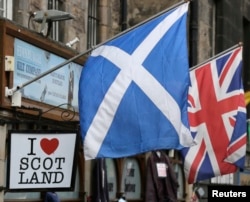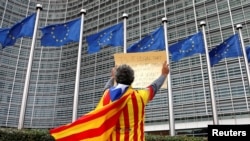Catalonia’s bid to break away from Spain took another twist this weekend as the former president of the region, Carles Puigdemont, handed himself in to Belgian police, having fled to Brussels last week.
Spain has issued an arrest warrant for him and several other Catalan leaders on charges of rebellion.
As Madrid seeks to quash the region’s independence efforts, other breakaway movements across Europe are looking on with interest — none more so than Scotland.
On the streets of Edinburgh and Glasgow, the Scottish "Saltire" flag has flown alongside the Catalan colors in recent weeks as pro-independence supporters offer solidarity from the far corners of Europe.
"Whether it’s the Basque Country, Catalonia, Scotland, and then going elsewhere to Palestine, to Kurdistan, they all have the right to exist as nations,” says French student Sonja Coquelin who joined the protests in Edinburgh last month.
Scotland already enjoys a level of autonomy from the United Kingdom government in London. The nation held an independence referendum in 2014 with the approval of the British government, and voted narrowly to stay in the union. Spain’s government should have taken lessons, says Scottish independence campaigner Chris Bambery, author of the forthcoming book "Catalonia Reborn."
“The question has to be, if [Spanish Prime Minister Mariano] Rajoy had done that, would he have won the referendum? And there’s a considerable body of opinion that says he would have done," said Bambery. "Every time that the Spanish state does intervene in a very heavy-handed way, it drives another tranche of people to make that conclusion and support independence.”
But Scotland’s experience should have also taught Catalonia a lesson, says Professor James Ker-Lindsay of St Mary’s University in Twickenham, London.
“If Scotland had voted for independence, we know that Britain would have allowed it to go its own way. But Spain said absolutely no way, we’re not even going to give that vote," he said. "And what we’ve actually seen is just the international community has rallied behind Spain and said ‘look, we’re not going to upset these rules.’”
Italy and Belgium also
Breakaway movements across Europe are eyeing Catalonia’s fate. Two of Italy’s richest regions voted for more autonomy from Rome in referrenda held last month.
In Belgium tensions between the Flemish-speaking north and French-speaking south threaten national unity.
“A lot of movements will at first have been rather jubilant about what Catalonia was doing. But I think what we’ve seen happen since then will be leaving a lot of them very disheartened. You know, they can press for independence, but unless they can get the support of the international community, it’s not going to happen,” says Ker-Lindsay.
The European Union has sided firmly with Madrid. History shows the bloc should be more sympathetic to populations who seek self-rule, argues Chris Bambery.
“The EU can look back in 1989 and say when the Soviet Union collapsed, actually the Baltic states and other countries got their independence peacefully. Czechoslovakia had an amicable divorce,” says Bambery.
Both Catalonia and Scotland have pinned their viability as independent states on membership of the European Union — misguidedly, argues Ker-Lindsay.
“The European Union isn’t empowered to recognize states. It’s the member states of the European Union that do that. Apart from anything else, Spain would veto it, and you need to have unanimous support to join the European Union,” he said.
Added to that, Ker-Lindsay says the EU is seeking to avoid further splintering just as the bloc battles to overcome Brexit and the migrant crisis.
But there are further complications on the horizon. The Scottish National Party, which has a big majority in the Scottish parliament, is pushing for another vote on independence once Britain leaves the European Union. While the EU would welcome a Scottish membership application as a propaganda coup post-Brexit, analysts say it would also likely fuel hopes of EU membership among other breakaway movements.









